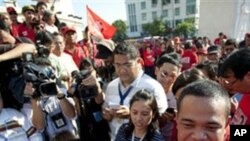Thai authorities shut down 13 community radio stations aligned with the opposition Red Shirt movement this week in what free speech advocates are calling the biggest crackdown on dissident media since deadly anti-government protests last year.
Authorities say the stations were operating illegally and broadcasting statements defaming the royal family, a serious crime in Thailand. But Human Rights Watch says the raids are part of a campaign to silence government critics ahead of national elections.
Brad Adams, executive director of Human Rights Watch Asia in Bangkok, spoke with VOA’s Sarah Williams about the crackdown.
What is Human Rights Watch asking the Thai government to do?
“We’ve called for them to revoke the closure order and to allow the stations to operate. This is peaceful expression and they appear to be closed down because there’s an election looming and the government wants to silence its fiercest critics.”
The government says these stations have offended the monarchy.
“That is what they say and they’ve said that with respect to dozens of other community radio stations and thousands of Web sites. The offense of lese majeste, which is insulting or defaming the king or queen, is now being used politically as part of the ongoing political struggle for power here. It is having a serious impact on political speech and political dialogue in Thailand.”
What role do community radio stations play in Thailand?
“They’re enormously important now in part because the media empire that Thaksin Shinawatra, the deposed prime minister who was ousted in a coup in 2006, has been dismantled. The Red Shirts are in large part supporters of Thaksin, and Thaksin actually is a financier and architect of the Red Shirt movement. And they generally are sympathetic to Thaksin and carry his messages and carry those of the UDD [United Front for Democracy against Dictatorship] leadership, the Red Shirt leadership, as well. They don’t have access to mainstream media very much anymore. And Thaksin for his part controlled the media very strongly when he was in power. So in a way, the current government is almost a mirror image of Thaksin, although Thaksin wasn’t as draconian towards the media and freedom of expression as the current government.”
This is happening nearly at the first anniversary of last year’s deadly political unrest. Is that having an impact on the crackdown?
“Well I think so. The government is going to dissolve parliament on May 6. So they’re calling elections and there will be a campaign launched immediately. And there’s every possibility of major street protests and demonstrations during that period. And May 19, which is the anniversary, will be one of those days when one would expect very large numbers of people to take to the streets. I’m in Bangkok and I’ve spoken to some of the UDD leaders, and they’re not sure what they’re going to do on May 19. There’s some talk of human chains being formed or traditional rallies being held. I do think the government and, maybe more to the point, the army, is quite jittery about further street protests by the Red Shirts.”




